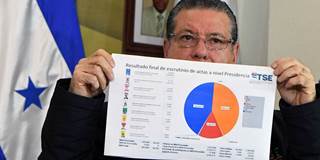
The Regional Repercussions of Honduras’s Botched Election
Once again, a serious breach of representative democracy has occurred in Latin America. Despite all the regional legal tools that have been created in recent years, an unfair and scarcely free election was probably stolen, or at best, tainted to the point that the result cannot be considered reliable.
MEXICO CITY – In Honduras, stolen elections, followed by accusations of fraud, street demonstrations, and military repression, are business as usual. So it wasn’t exactly shocking when the presidential election in late November, marred by numerous irregularities in the vote count, led to all three. But the consequences are likely to reverberate throughout Latin America.